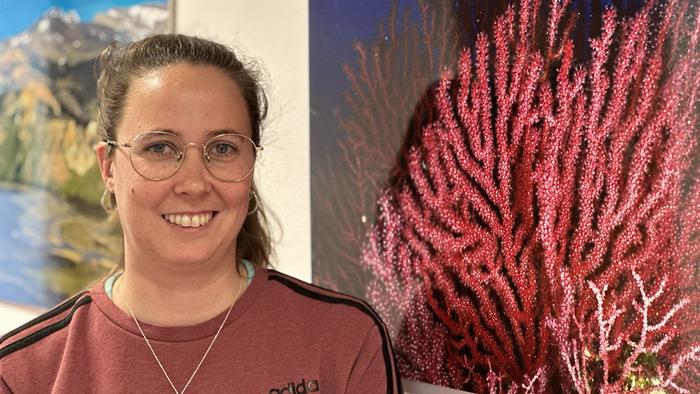The increase in the frequency and intensity of marine heatwaves in recent decades is one of the effects of global climate change. A study by the University of Barcelona, published in the Journal of Animal Ecology, shows that the extreme heatwave of 2022 caused an “unprecedented” increase in mortality of the red gorgonian Paramuricea clavata, affecting 70% of the colonies located in the Montgrí Natural Park, the Medes Islands and the Baix Ter. According to the researchers, these results are “alarming and threaten the viability” of this species of great value for the biodiversity of benthic ecosystems, since it is considered to be an inhabitant-forming species.

Credit: UNIVERSITY OF BARCELONA
The increase in the frequency and intensity of marine heatwaves in recent decades is one of the effects of global climate change. A study by the University of Barcelona, published in the Journal of Animal Ecology, shows that the extreme heatwave of 2022 caused an “unprecedented” increase in mortality of the red gorgonian Paramuricea clavata, affecting 70% of the colonies located in the Montgrí Natural Park, the Medes Islands and the Baix Ter. According to the researchers, these results are “alarming and threaten the viability” of this species of great value for the biodiversity of benthic ecosystems, since it is considered to be an inhabitant-forming species.
The UB researcher Graciel·la Rovira is the first author of this publication, which has been coordinated by Professor Cristina Linares, ICREA Academy Professor at the Faculty of Biology and the Biodiversity Research Institute of the UB (IRBio). Researchers from the Mediterranean Institute for Advanced Studies (IMEDEA, CSIC-UIB), the Institute of Marine Sciences (ICM-CSIC) and the University of Toulon (France) have also participated.
Four years with temperatures above 24.3°C
The new study has evaluated the impact of marine heatwaves, which took place between 2016 and 2022, on seven populations of the octocoral P. clavata, located in this marine protected area. The analysis of the results has shown that mortality rates (obtained from the calculation of the cumulative proportion of colonies affected and the dead surface) increased significantly the years in which these episodes were warmer and longer: 2017, 2018, 2019 and 2022.
In these four years, temperatures were higher than 24.3°C, with 2022 being the year with the highest mortality. “In 2022, the total proportion of colonies affected by the 50 days of heat wave was about 70%, with a percentage of surface area affected of almost 40%, reaching values never observed in this area as soon as the monitoring of these populations is to be initiated,” the authors note.
This negative impact is also the result of the events of previous years, since the recovery of these organisms is, according to the researchers, “very slow”. “In the mortality of a particular year, we see the mortality of the previous year too. Therefore, in 2022 it presents an accumulated mortality of all past years”, stresses Graciel·la Rovira, who is a member of the UB’s Department of Evolutionary Biology, Ecology and Environmental Sciences.
Point of no return
To date, P. clavata populations in this small marine reserve had withstood heatwaves in previous years better than other populations in the Mediterranean. This resilience had led researchers to believe that these populations could be considered a climate refuge. “The impacts documented in this study show a worrying future for P. clavata populations throughout the Mediterranean and suggest that the resilience of this species may not be enough to sustain its populations under the projected warming scenario”, the researchers note.
Moreover, these results have important implications beyond the survival of the species itself. “Since P. clavata is a habitat-forming species, that is, many other species can live thanks to it (they use it, for example, as a refuge), its disappearance could have a strong impact on the biodiversity and functioning of these ecosystems”, says Rovira.
This critical situation means that, even with the application of measures to reduce “as much impact as possible” in the protected area, the researchers are pessimistic about the possibility of the species’ recovery. “The unprecedentedly high mortality, together with the predicted climate change scenarios, means that these populations are probably at a point of no return,” concludes Graciel·la Rovira.
Journal
Journal of Animal Ecology
Method of Research
Observational study
Subject of Research
Animals
Article Title
When resilience is not enough: 2022 extreme marine heatwave threaten climatic refugia for a habitat-forming Mediterranean octocoral
Article Publication Date
12-Jun-2024



